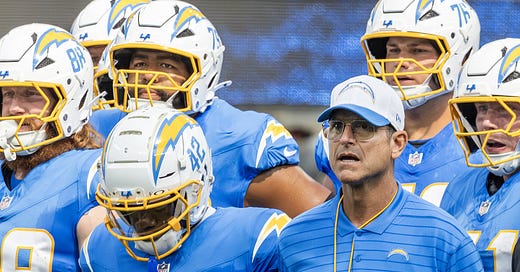What Might the End of “Chargering” Look like with Jim Harbaugh?
L.A. lost a ton of winnable games last season. How have other teams done after those types of years?

The Los Angeles (née San Diego) Chargers have always been notorious for losing close games and squandering big-time talent. But under former coach Brandon Staley, that reputation reached legendary levels. L.A. went 0-7 in games decided by 3 points or fewer in 2023, joining the 1994 Houston Oilers as the only teams since the 1970 AFL merger to accomplish such a feat. And during Staley’s three-year tenure overall, the Chargers went 6-14 in games decided by a field goal or less — tying the 2000-02 Carolina Panthers (who went 2-14) for the most losses by 3 or fewer points in any three-season span since the merger.
It got so bad that the phenomenon received its own nickname: “Chargering”.
But the 2024 season represents a new era for the Bolts — we think. Fresh off of a national championship at Michigan,1 Jim Harbaugh has arrived in Los Angeles to save the Chargers from themselves. The man certainly has a better track record in the games that Staley couldn’t win; between Stanford, the 49ers and Michigan, Harbaugh went a much more normal 16-15-1 in games decided by a field goal or less over the years. So will “Chargering” end in 2024? And if it does, how much credit should Harbaugh receive?
One of sports analytics’ longest-held tenets is the idea that, in smaller samples at least, a team’s record in blowouts is actually more telling than its record in close games.2 (“Championship teams beat their good opponents convincingly and destroy the cupcakes on the schedule,” as Football Outsiders once put it.) A related notion is that the Pythagorean formula — which estimates the winning percentage we’d expect a team to have based on its point differential — is better at predicting future records than a team’s actual winning percentage. (Eat your heart out, Bill Parcells.)
Because of their many close losses, the 2023 Chargers were tied for the NFL lead in the biggest negative differential between actual and Pythagorean records — they and the hapless Carolina Panthers both fell short by 2.4 wins. That’s not an NFL record or anything; the 1981 New England Patriots won 5.3 fewer games than we would expect (prorated to a 17-game schedule), and the infamous 0-16 Cleveland Browns of 2017 “should” have won 4.5 more games per 17. But Staley’s Chargers are among the 100 worst offenders in this regard since the merger.
And it really is true that most of these shortfalls are usually just the product of bad luck (provided you aren’t some kind of cursed franchise). Teams that finished between -2 and -3 wins per 17 relative to what Pythagoras predicted tend to improve by 2.9 wins per 17 the following season — which actually made up all of their average shortfall (-2.4 wins versus expected) and then some.
But what’s really interesting is what happens when we break that group of Charger-like teams into those who changed coaches (46 percent of the sample) and those who kept the same coach the following season:
Of the teams in our sample who got a new coach — like Los Angeles did when they went out and got Harbaugh — those clubs only improved by 2.2 wins per 17 the following season, on average. But the teams who didn’t replace their coach improved by an average of 3.4 wins year-over-year.
That’s a difference just on the edge of being statistically significant (p-value of 0.057)… but if you’re the Chargers, would YOU have kept Staley and run it back, hoping for better luck?3 I probably wouldn’t have. If I’m a Charger fan right now, I’m thrilled to have Harbaugh at the helm.
And if the history of our data is any guide, they probably will stop “Chargering” this season. Harbaugh will get the credit, Herbert will be back in the playoffs, and he might even win a game once he gets there. How much of that would have happened anyway? We’ll never know. But some positive regression was bound to happen; 78 percent of the teams in our sample had more wins per 17 the season after their big Pythagorean shortfalls.
Harbaugh stepping into a situation where most coaches do better — and as a matter of fact, the same coaches do better even more often than new coaches do — makes me think of Doug Drinen’s old (tongue-in-cheek, I think?) rant about Bill Parcells getting credit for turning teams around, when in fact he walked into situations where positive regression to the mean was always going to mean his teams improved. Just like Parcells, Harbaugh is a great coach, but he will probably get more credit for turning the Chargers around in 2024 than he should based on what any other coach (or maybe even Brandon Staley himself) would have done.
Filed under: NFL
We won’t talk about that recent NCAA punishment he retroactively received for recruiting violations… or the related suspension he received for the first three games of the 2023 season… or the sign-stealing scandal that got him suspended for three more games later that season.
In the NBA — the ultimate large-sample sport — my former colleague Ben Morris found evidence that a team’s knack for winning helps predict playoff performance even after controlling for its point differential.
There may also be some kind of sample bias that makes this a chicken-or-egg question: Do teams that keep the coach in these situations have some kind of knowledge that they were extra-unlucky (above and beyond what’s being captured by Pythagoras) and therefore more likely to turn things around if given another chance?




